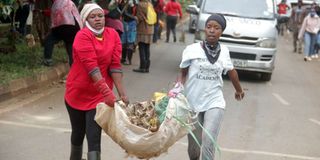
Did you know that youth unemployment is one of the Africa’s biggest challenges? Many young people, especially in urban areas, struggle to find jobs, forcing them into street life for survival. But in Kenya, an innovative government program—Kazi Mtaani—is rewriting this narrative by offering youth employment while revitalizing communities.
What is Kazi Mtaani?
Kazi Mtaani (Swahili for “Neighborhood Jobs”) is a government initiative launched in July 2020 to tackle youth unemployment and urban poverty. By engaging young people in community service and infrastructure projects, the program has not only created jobs but also transformed cities and empowered over 341,000 youth.
How Does It Work?
The program specifically targets youth aged 18-35 from informal settlements who face limited job opportunities. Here’s how it operates:
✅ Paid Community Work – Young people are employed in activities like street cleaning, waste collection, drainage repair, and urban beautification.
✅Fair Compensation – Participants receive a daily wage of Ksh. 455 ($3.50) for workers and Ksh. 505 ($3.90) for supervisors, directly through mobile banking.
✅Gender Inclusion – The program has had 52% male and 48% female participation, ensuring gender balance.
✅Skill Development – Youth receive training in entrepreneurship, financial literacy, and vocational skills to enhance long-term employability.
Where Has Kazi Mtaani Been Implemented?
Kazi Mtaani has been rolled out in 900 informal settlements across all 47 counties in Kenya, including major urban areas such as:
Nairobi County – Kibera, Mathare, Mukuru
Mombasa County – Bangladesh, Kisauni
Kisumu County – Nyalenda, Manyatta
Nakuru County – Kaptembwo, Rhonda
Eldoret (Uasin Gishu County) – Langas, Huruma
The Impact: More Than Just Jobs
1️⃣Crime Rates Have Dropped
Many unemployed youth previously turned to petty crime, drug abuse, and gang activities to survive. With Kazi Mtaani, they now have a legal and sustainable source of income, reducing crime rates in many urban areas.
2️⃣Cleaner, Greener Cities
Ever walked down a freshly cleaned street? Thanks to Kazi Mtaani, Kenyan cities are cleaner, safer, and more organized, with improved waste management and green spaces.
3️⃣Economic Empowerment
For many participants, this initiative has been a stepping stone to financial independence. Some have used their earnings to start small businesses, while others have saved money for further education.
4️⃣Youth Skills Development
Beyond temporary employment, Kazi Mtaani equips young people with valuable skills, making them more competitive in the job market. Many have transitioned into permanent roles in
construction, environmental conservation, and other industries.
Budget and Funding
The Kenyan government allocated approximately Ksh. 10 billion ($76 million) to implement the Kazi Mtaani program in three phases:
Phase 1 (July 2020 – August 2020) – Piloted in eight counties
Phase 2 (November 2020 – June 2021) – Expanded nationwide
Phase 3 (2022 – 2023) – Final phase, with an emphasis on skills development
Challenges and the Road Ahead
While Kazi Mtaani has been a game-changer, some challenges remain:
⚠️Short-Term Nature –Since the program is temporary, there are concerns about what happens to youth once it ends.
⚠️Payment Delays – Some regions have reported delays in salary payments, affecting participants’ morale.
⚠️Sustainability – Expanding the program into a long-term employment initiative could make an even bigger impact.
Why the World Should Pay Attention
Africa’s youth population is rapidly growing, and unemployment remains a pressing issue. Kenya’s Kazi Mtaani provides a scalable model that other nations can adopt to empower young people while improving urban environments.
Where to Learn More
For official details on KaziMtaani, visit the Kenya State Department of Housing and Urban Development, and State Department of Youth Affairs, and Creative Economy websites:
🔗Ministry of Lands, Public Works, Housing & Urban Development
🔗Ministry of Youth Affairs, Creative Economy, and Sports
Final Thoughts
Kenya’s Kazi Mtaani program proves that with the right policies, youth unemployment can be tackled effectively. By giving young people jobs, dignity, and skills, initiatives like this don’t just change lives—they transform entire communities.
🔹 What are your thoughts on Kazi Mtaani? Could a similar program work in your country? Share your opinions in the comments below!
Related posts:
How Urban Policies Shape the Lives of Marginalized Communities
The Impact of Informal Settlement Upgrading Projects: Case Studies & Lessons Learned

Wowww nice